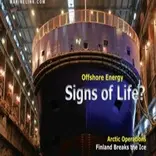EU commits to help the Arctic adapt to climate change
In view of the challenges facing the Arctic due to global warming, the High Representative of the European Union for Foreign Affairs and Security Policy/Vice-President of the European Commission, Federica Mogherini, the Minister for Foreign Affairs of Sweden Ann Linde, and European Commissioner Karmenu Vella, stated that the EU is strongly committed to helping the region adapt to climate change.

In view of the challenges facing the Arctic due to global warming, the High Representative of the European Union for Foreign Affairs and Security Policy/Vice-President of the European Commission, Federica Mogherini, the Minister for Foreign Affairs of Sweden Ann Linde, and European Commissioner Karmenu Vella, stated that the EU is strongly committed to helping the region adapt to climate change.
As they said, the EU aims not only to protect the Arctic, but develop its economy in a sustainable way as well.
"We are delivering on this commitment in three practical ways: by investing in research and development, by protecting local ecosystems and biodiversity, and where appropriate, by building better infrastructure to connect the region to the mainland, including broadband connection"
For this reason, the EU recognises the need to collaborate with national, regional and local authorities in the European Arctic. It also pointed out its commitment to enable Arctic stakeholder engagement in the European Arctic region.
Currently, with three EU Member States and two European Economic Area members being Arctic states, the EU has taken a strategic role and interest in the Arctic remaining a “low-tension–high cooperation” area.
Its aim is to promotes sustainable economic development in the Arctic region, based on the best available science. It also considers the impact on fragile ecosystems as well as the living conditions of local populations, and especially the indigenous peoples.
As the EU is directly affected by climatic and environmental changes in the Arctic, the Special Report by the Intergovernmental Panel on Climate Change (IPCC) on oceans and the cryosphere has strongly reinforced the message that the world must limit global warming to 1.5°C. Thus, the EU is committed to reducing global greenhouse gas emissions and becoming a carbon-neutral economy by 2050.
"The EU will continue to contribute to international and regional cooperation in the Arctic through enhanced work on climate action and environmental research, sustainable development, as well as concrete cooperation with Arctic states, institutions, indigenous peoples and local communities"















![AIRBUS A380 [MORE THAN 600 PASSENGER’S CAPACITY PLANE]](https://cdn.tinn.ir/thumbnail/4jCp4EQvCU0b/IjHVrSYQrIAqIzXuTzADR7qLYX4idQT4nfq__26E5SCUPLMqfhWkWajvuO9Wfq1ql1TjV4dhkrHliNQU82kMpo2NNftT_NGEwHc9KXtN_rk731bmifa2IQ,,/airbus-a380-structure1.jpg)

Send Comment